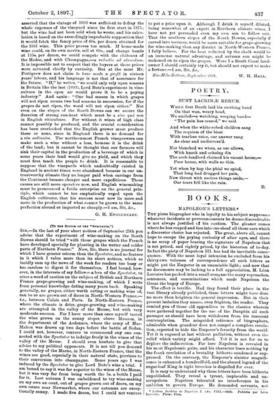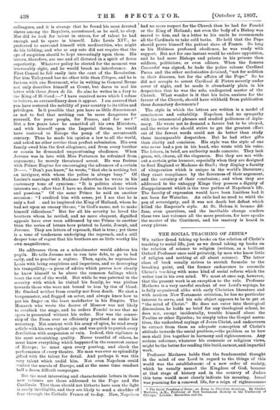BOOKS.
NAPOLEON'S LETTERS.* THE pious biographer who in loyalty to his subject suppresses whatever incidents or pronouncements he deems discreditable is not always justified cf his caution. The gleaner comes where he has reaped and ties into one sheaf all those ears which a discreeter choice has rejected. The great, above all, cannot hope to escape the prying curiosity of after ages, and there is no scrap of paper bearing the signature of Napoleon that is not prized, and rightly prized, by the historian of to-day. In fact the piety of Napoleon III. has had its inevitable conse- quence. With the most loyal intention he excluded from his thirty-two volumes of correspondence all such lettere as might pat the Emperor in an nnamiable light; and now that no documents may be lacking to a full appreciation, M. Mon Lecestre has packed into a small compass the many reproaches, sentences, and comminations which made Napoleon the Great the bogey of Europe.
The effect is terrific. Had they found their place in the vast library already published, these letters might have done no more than heighten the general impression. But in their present isolation they amaze, even frighten, the reader. They remind you of those old appendices to the classics wherein were gathered together for the use of the Dauphin all such passages as should have been withdrawn from his innocent contemplation. The misguided retioence of biographers, admirable when grandeur does not compel a complete revela- tion, expected to hide the Emperor's ferocity from the world. Yet it is exposed at last without palliation, without even the relief which variety might afford. Yet it is not for us to deplore the indiscretion. For here Napoleon is revealed in his most Napoleonic guise, and his character loses nothing by the frank revelation of a brutality hitherto condoned or sup- pressed. On the contrary, the Emperor's sinister magnifi- cence is enhanced a hundredfold, and the absurd legend of the sugar-loaf King in tight breeches is dispelled for ever.
It is easy to understand why these letters have been hitherto unpublished. They reveal a tyrant, implacable and un- scrupulous. Napoleon tolerated no interference in his ambition to govern Europe. He demanded servants, not
• Lettros Inedites do Napoleon I. (An. VIII.-1815). Fabliau par Leon Lecestre. Paris: Pion. colleagues, and it is strange that he found his most devoted slaves among the Royalists, accustomed, as he said, to obey. Nor did be look for talent in others, for of talent be had enough and to spare in himself. Like Louis XIV., he preferred to surround himself with mediocrities, who might do his bidding, and who at any rate did not require that the eye of suspicion should be kept unceasingly upon them. His letters, therefore, are one and all dictated in a spirit of fierce superiority. Whatever policy he elected for the moment was irrevocably right, and he would brook no interference. As First Consul be fell easily into the cant of the Revolution. For him Talleyrand has no other title than Citoyen, and he is furious with one Bourmont, who in writing to General Brune not only describes himself as Count, but dares to seal his letter with three fleure de lie. So also he writes in a fury to the King of Holland :—" I have received news which I refuse to believe, so extraordinary does it appear. I am assured that you have restored the nobility of your country to its titles and privileges. Is it possible that you have so little discernment as not to feel that nothing can be more dangerous for yourself, for your people, for France, and for me ? " But a few years later he ennobled all his own Ministers, and with himself upon the Imperial throne, he would have restored to Europe the pomp of the seventeenth century. Thus he made his opinion a law to all the world, and asked no other service than perfect submission. His own family owed him the first allegiance, and from every brother or cousin he demanded unquestioning obedience. When Jerome was in love with Miss Patterson he refrained from argument; be merely threatened arrest. He was furious with Prince Eugene for encouraging the advances of a certain D—. " Don't you know," he wrote, " that she is nothing but an intriguer, with whom the police is always busy." Of Lucien's marriage with Madame Jouberthon he wrote in his customary tone of cynicism : "It is politics alone which interests me; after that I have no desire to thwart his tastes and passions." Of the same Prince he said on another occasion : "I credited him with sense, yet I see that he is only a fool and he implored the King of Holland, whom he had set upon an uneasy throne, " in God's name, not to make himself ridiculous." But for all his severity he loved the brothers whom he reviled, and no more eloquent, dignified appeals have ever been addressed by one Prince to another than the series of letters here printed to Louis, Joseph, and Jerome. They are letters of reproach, that is true ; yet there is a tone of tenderness underlying the reproach, and a still deeper tone of regret that his brothers are so little worthy his own magnificence.
He addresses them as a schoolmaster would address his pupils. He tells Jerome not to run into debt, to go to bed early, and to practise a regime. Then, again, he reproaches Louis with being suspicious and imperious, and so destroying his tranquillity,—a piece of advice which proves how clearly he knew himself to be above the common failings which beset the rest of the world. But while he was paternal in the severity with which he visited his family, he was pitiless towards those who were not bound to him by ties of blood. He flinched neither from cruelty nor from death. He shot a burgomaster, and flogged an actor, and always knew how to put his finger on the least malefactor in his Empire. The Monarch who wrote the decree of Moscow was not likely to overlook the stage, and he orders Fonche to see that no opera is presented without his order. Nor was the censor- ship of the Press ever so efficiently practised as under his autocracy. Not content with his army of spies, he read every article with his own vigilant eye, and was quick to punish every dereliction with suspension or ruin. Indeed, this vigilance is his most astonishing quality. Never trustful of others, he must know everything which happened in the remotest corner of Europe; he must open every postbag, and check the performance of every theatre. No man was ever so splendidly gifted with the talent for detail. And perhaps it was this very talent which undid him. Not even Napoleon could :ontrol the morals of Europe, and at the same time conduct half a dozen difficult campaigns.
But the moat interesting and characteristic letters in these new volumes are those addressed to the Pope and the Cardinals. That these should not hitherto have seen the light is easily intelligible, and they are likely to send a shudder of fear through the Catholic France of to-day. Now, Napoleon
had no more respect for the Church than he had for Fouche or the King of Holland ; not even the body of a Bishop was sacred to him, and in a letter to his uncle he recommends all the Cardinals to take cold baths. He held that the Pope should prove himself the patient slave of France. So long as his Holiness professed obedience, he was ready with support. But not for one instant would he endure opposition, and he had more Bishops and priests in his prisons than soldiers, politicians, or even editors. When the famous Concordat was signed, he bade the police release Cardinal Pacca and the other ecclesiastics detained, "not for sedition in their dioceses, but for the affairs of the Pope." So he did not scruple to arrest Cardinal di Pietro secretly under cover of night, and he made it abundantly plain in his despatches that he was the sole, undisputed master of the Church. What wonder is it that his heirs, anxious for the favour of the Church, should have withheld from publication these damnatory documents ?
The style in which the letters are written is a model of conciseness and suitability. Napoleon had no sympathy with the ornamental phrases and studied politeness of diplo- macy. He wrote not to demand a favour but to be obeyed, and the writer who should strive to get the greatest effect out of the fewest words could not do better than study these incomparable despatches. But he had other gifts than clarity and concision. His style was the style of one who never had a pen in his hand, who wrote with his voice. The letters, in brief, are authority made concrete. They lack grace, wit, charm, all the elegances. But they are not with- out a certain grim humour, especially when they are designed to flout England or Madame de Stael ; they display a faculty of vituperation which is unique in the world's literature ; they exact compliance by the fierceness of their argument, and the certainty of their conclusion ; and when they are addressed to the unhappy Kings they possess a dignity of disappointment which is the true pathos of Napoleon's life. The faculty of expression would have been limitless had it not been for Waterloo. An exile had no need to wield the pen of sovereignty, and it was not death but defeat which killed the Emperor's style. At St. Helena it became dif- fuse, even querulous, and the inevitable change renders these two last volumes all the more precious, for here speaks the master of the Continent, and his mastery is heard in every phrase.







































 Previous page
Previous page